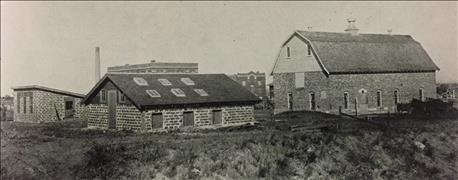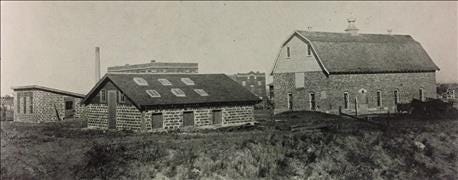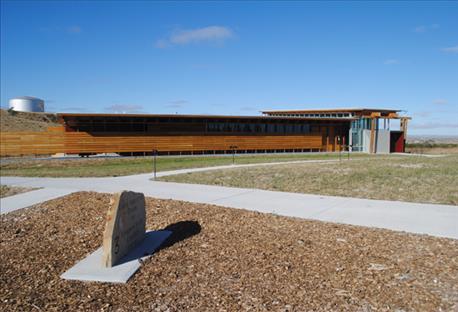
The agriculture department at Chadron State College was dropped twice over the 105-year history of the institution, but now the college's range management program is recognized as one of the top such programs in the country. How has the CSC agriculture program, and range management in particular, evolved over the years?
Related: Chadron State College touts new range complex, large range management program

HISTORY OF THE FARM: In this early photo of the old college farm at CSC, you can see that the agriculture program had developed considerably since its inception in 1911. However, over the 105-year history of the college, the ag program was dropped entirely twice. (Photo courtesy of CSC)
Today, CSC offers Bachelor of Science majors in rangeland management with several options, including ecology, fire management, livestock management, wildlife management and equine. The school offers a Bachelor of Arts comprehensive major in the business administration department with an agribusiness option. Two Bachelor of Science degrees are offered in partnership with the University of Nebraska, including one in natural resources with a major in grassland ecology and management, and another in agricultural sciences with a major in agricultural education. The agriculture department recently opened new facilities, including the $2.9 million Coffee Agriculture Pavilion and the $4 million Rangeland Lab.
Jim O'Rourke taught plant science courses at CSC from 1988 through 2002. O'Rourke designed and obtained clearance for the range management degree program in 1993. Now retired, O'Rourke researched and wrote a history of the roller-coaster ride of the ag program at Chadron.
"I look at the history of the ag program, and it all started when the college opened as the State Normal School in 1911," O'Rourke says. "The college president called for an agriculture position."

HOME ON THE RANGE: This new $4 million Rangeland Lab was dedicated in 2015 and has been celebrated as a state-of-the-art facility for the second-largest range management program in the U.S. at CSC.
According to the 1911-12 curriculum catalog, an agriculture program was offered with classes in general agriculture, agronomy and soils, animal husbandry, horticulture, and entomology and ornithology being taught by Dean W.T. Stockdale. As the program grew, a college barn and other facilities were built beginning in 1918. However, by 1926, the entire agriculture department was dropped.
It wasn't until 1946 that agriculture courses reappeared, with the college offering two-year prevocational agriculture acceptable as the first two years in a four-year program with the University of Nebraska-Lincoln College of Agriculture. The college at Chadron changed its name to the Nebraska State Teacher's College in 1949, and several agriculture courses were added to the curriculum. The first range beef production class was offered, noting the first course at Chadron to use the word "range."
Although 250 students would go through the agriculture program in the next 10 years, the department was dropped again in 1956, with 49 students still enrolled when it was eliminated. The college barn was dismantled in 1963, and it wasn't until the early 1970s that agriculture made a resolute comeback to the renamed Chadron State College.
"If you look at the high points and low points of the program, the reason in my mind that it was such a roller coaster was that someone would be hired to teach agriculture and they had a particular focus," O'Rourke explains. "While that person was here, the agriculture program did well, but as soon as they retired or passed away, it declined until someone else came." Joe Falkenburg joined the CSC staff in 1974 to reinstate the agriculture program, O'Rourke says. During the late 1980s and early 1990s, range management became one of the hallmark programs in agriculture, thanks to dedicated instructors and administrators, he says.
"The program really didn't grow that rapidly at first," O'Rourke recalls. "It took some time and some recruiting of students for us to be known for range management." The key for CSC has been a focus on ranch kids. "We have focused on our audience, which are ranch kids coming here, graduating and then going back to the ranch and their cow-calf operations," says O'Rourke. "Our students spend a great amount of time in the pastures, getting hands-on experience and applying range management every day."
He says that the program has grown because of the passion for range management in cow-calf country and teaching about those techniques by the staff. The program has also received key support from the college administration at crucial points in time.
"When I was doing research for the history, I was surprised at how long the ag program has been around here," O'Rourke says. "It started out when the college was founded. For many times during the history of the program, it lacked focus or emphasis, but over time, we have honed in on range management," he says.
"Now, we have become recognized." With 140 students currently enrolled in range management at CSC, the program ranks as the second largest in the nation.
About the Author(s)
You May Also Like






